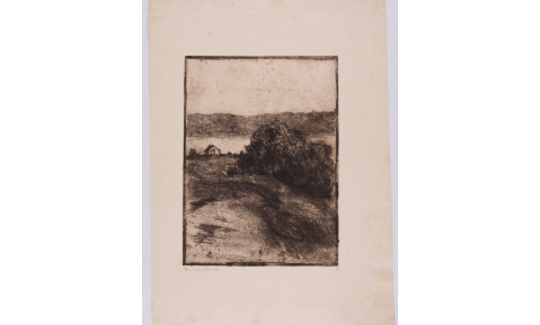"Hermann Struck: A Foreign Homeland"
Thursday, 11.07.19, 20:00
Friday, 24.01.20
:
Svetlana Reingold
More info:
04-6030800Hermann Struck, born and raised in Berlin, was firmly rooted in the capital’s soil. He had studied at the Berlin Academy of Art and was a member of the city's artists' association. Though he left Germany in 1922 in favor of Haifa, he held on to his studio in Berlin's Hansa quarter. Struck visited Germany regularly until 1933, especially during the summer months. In those years the German capital became a modern metropolis teeming with motion and innovation. At the same time, the status of rural ideals rose, despite the decline of the countryside's economic status. As a witness to this trend, during his Berlin days Struck often depicted views of the German rural landscape. These works are at the center of the present show.
Scholar Gideon Ofrat associates Struck's images of rural landscapes with the conception that idealized rural life and rejected the technological industrialization of the city in favor of a realistic representation of harmony between peasants and their land. In this context, the idea of Heimat (German for "homeland") can assist in analyzing Struck's reservations regarding modernity. It seems Struck identified with the Heimat idea, in reaction to Germany's swift modernization and the cultural anxieties accompanying it. This concept denotes the attempt to form a vision of a secure and stable world, in which everyone has a clearly defined place that they can call home.
The idealization of the village clearly indicates Struck's affinity with German Romanticism. Struck saw the village as an "untouched paradise," preserving nineteenth-century fantasies about an ideal, romantic landscape. According to Ofrat, Struck's affinity with German Romanticism stemmed from his love of etchings and lithographs of landscapes in the style of the Berlin Secession – a society that organized exhibitions of innovating artworks. Following a meeting with artist Max Liebermann, the movement's founder and president, Struck began exhibiting his works in the society's shows from 1901 onwards. Liebermann was one of the representatives of the neo-Romantic movement and was close to the Hague School of naturalist-rural painting. Through him, Struck met Jozef Israëls, one of the leaders of the Hague school of Dutch genre landscape paintings, and became his pupil. His encounter with Israëls lent Struck's works the atmosphere of the flat, sky-filled landscape familiar from Dutch paintings.
Struck's moderate Romanticism is convincing, with its attraction to nature alongside signs of its taming. Struck often combined houses and trees in his works, as an expression of the integration between nature and culture. This conception is rooted in his contemporaries' renewed discovery of the natural world as a resource and a sanctuary from the processes of urbanization and industrialization. Struck's early rural landscapes attest to his thoughts regarding the future of the Jewish people in light of the swift changes occurring in modern times. Which side deserved his support – those who believed in the German identity of the Jews and in their assimilation in German culture? Or those who were convinced that only in Palestine could Jews live freely and fulfill their destiny? Where was the true Jewish homeland?
The search for the rural ideal appears in Struck's works after his arrival in Palestine as well. His ambivalent attitude towards modernity could be seen in his attraction to the figure of the Arab, who for him represented the idyllic East, where had come to a standstill. Struck depicted the Arab in many of his works created in Palestine. His Orientalist view of the variety of "native" characters, whether men or women, stands out, for example, in a letter from 1926: "Wandering here […] are proud Arabs, savage Bedouin from the desert, with their donkeys and caravans of camels. By their side are their women, their faces tattooed and their backs remarkably straight – a trait typical of the daughters of the East."





